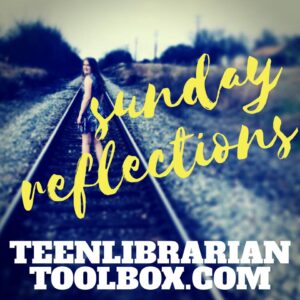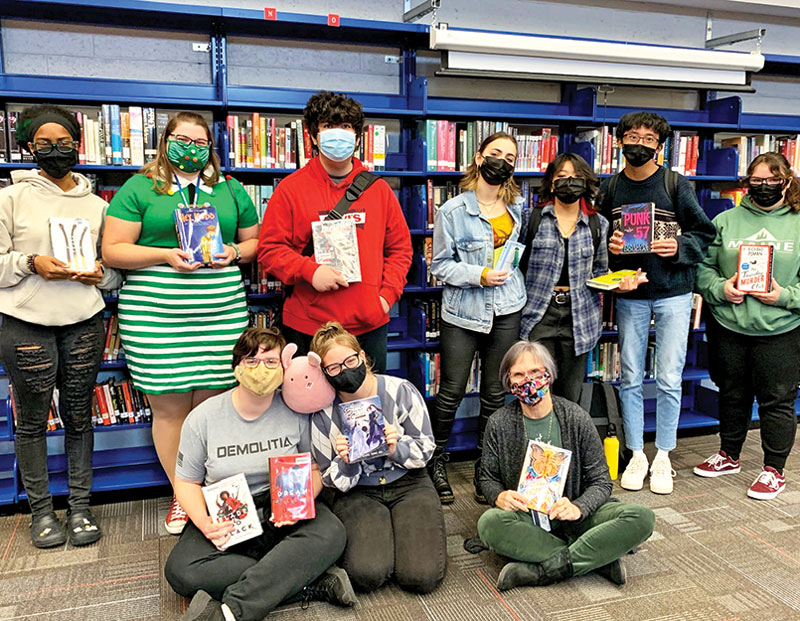Sunday Reflections: Can Public Libraries Be Open to Hate and Be a Welcoming Place? A look at the recent pronouncement from the Office of Intellectual Freedom
Disclaimer: I am not a lawyer, nor do I play one on TV.
Trigger Warning: This post discusses hate crimes and genocide.
The day after the 2016 election, I walked into my Teen MakerSpace not sure what to expect. I personally had spent the entire night crying because as a woman who advocates regularly against sexual violence, I was gutted that our nation had just elected a self-professed sexual predator as its leader. To be honest, I’m never going to forgive any of us for that. Women, of course, were not the only group to be fearful of this election outcome as it was very clear that Donald Trump and his supporters were specifically advocating against the safety and civil rights of a variety of groups, including the LGBTQ population, people of color, the disabled, and Muslims.
So I walked into the space and there sat one of my LGBTQ teens and a handful of other teens. They started talking about the election results, as I knew they would. At one point, this teen looked the other group of teens right in the eyes and said, “Do you know what they want to do to me?” The GOP has been very vocal that they are anti-LGBTQ, and some members of the party even advocate for a process known as conversion therapy, which has been classified as torture by some human rights groups and is outlawed in several countries and in some states.
ADVERTISEMENT
ADVERTISEMENT
Library Meeting Rooms for All – Intellectual Freedom Blog
I have thought a lot about this girl and several of my other teens in the recent weeks as it was announced that the Office of Intellectual Freedom, a subdivision of the American Library Association, passed a resolution indicating that public libraries that have public meeting rooms must make those meeting rooms open and available to hate groups. I’m not sure what the impetus for this resolution was, but the specifically added the word “hate groups”, suggesting that hate groups are on equal footing as sports organizations and the local gardening club.
Since the 2016 election, there has been a documented increase in both hate speech and hate crimes against marginalized groups. We will all recall at a white supremacist rally in Charlottesville, Heather Heyer was purposefully killed as she counter protested against a white supremacist group. Women wearing hijabs are having them forcibly removed on the street, Mexican men are being assaulted and told to return to their own country, and black people are having the police called on them regularly for merely existing in this world. And if you are a black person, you have a much higher chance of being killed by the police. There’s a lot of hate in our world right now and a lot of it is resulting in a violation of basic civil and human rights, and for marginalized people, it can be literally deadly.
Hate groups are different in that they specifically organize around their, well, hate and their goal is to oppress if not outright eliminate the object of their hate. The Nazis didn’t just want to sit around and talk about how much they hated Jewish people, they were in the process of practicing outright genocide. Now, the Office of Intellectual Freedom is telling public libraries that we must open our meeting room doors and allow these groups to come in and use our spaces to make their plans for genocide while the very people they are targeting browse for books or attend storytimes with their children in another part of the library. This doesn’t seem like it is just a free speech issue, it seems like it is a health and safety issue. And what does it mean if one group of people want to use their free speech to violate the civil rights of another group of people? What does it mean if they are literally making plans for a genocide?
On the one hand, I do believe they are technically and legally correct. By definition, free speech demands that we must allow all people to speak, even if it is speech that we disagree with. On the other hand, this is far more than a free speech issue, as it is a staff and patron safety issue. Remember, hate groups don’t just sit around and discuss unpopular opinions, they are actively working towards oppressing and, in a lot of cases, outright doing harm to the targets of their wrath. I don’t want to be at work on a day like Charlottesville where the white supremacists are meeting at my library and they start attacking the gay teen walking into the library.
ADVERTISEMENT
ADVERTISEMENT
I have been doing a lot of research and reading on this subject in the past week as I wrestled with what this declaration means and how I can reconcile it with my personal and professional ethics. I found this document which discusses extremist groups and public libraries which was produced by the Anti-Defamation League. It suggests that libraries that have rooms don’t have to open those rooms to the public or that you can be strict in the rules regarding your meeting room spaces, as long as you are consistent in how you apply your rules. The OIF made a follow-up statement stating the same thing, public libraries don’t have to make their meeting rooms open to the public but if you do, you must be consistently open to the public, including being open to hate groups.
You can also find a lot of good discussion about this recent OIF proclamation by following the hashtag #NoHateALA on Twitter.
Several years ago I had the honor of working beside a distinguished librarian. She was knowledgeable, service oriented, kind, professional, and a powerhouse. It was a time of great transition in our system and as the administration made a lot of decisions that she could not agree with, she was lucky in that she was able to resign and walk away stating, “this isn’t what I became a librarian to do.” The direction that library was taking no longer coincided with her personal and professional ethics so she made the hard decision to walk away. I have thought about her, too, in all of this and wondered if push came to shove, if I was asked to do something that would make me complicit to something which I fundamentally disagree with, would I be able to walk away. I have a mortgage to pay and children to feed, but I think all of us have to wrestle with where the line is for us personally and when we may have to walk away from a job or choose to violate our own personal or professional ethics. (FTR, I am not here talking anything about the current library system in which I work and that I love, I’m just considering the larger professional discussion here.)
I am not here today with answers. As I mentioned, I’m not sure what is the legal response in this situation. I know that this does cause great concern for me in terms of staff and patron safety, and I feel we have an obligation to that as well. Then there is simply the matter of morality. I do not want to be complicit to oppressing or harming others. I do not want to look back one day and realize a genocide has occurred and find myself on the wrong side of history. I think about this a lot both professionally and personally. I do believe we are a critical moment in history here and when we come out of it, I want to be able to say I stood up for what I believed was right and have my children be proud to see that I fought the good fight against hatred and oppression. I want to stand before my personal God and have him say that I followed his one golden rule, do unto others as you would have them do unto you.
What I do think needs to happen right now is that every public library should be talking to their boards and their legal counsel and training their staff. We need to have solid policies and procedures in place before we get the phone call from the local white nationalist group asking to use our spaces so that our staff knows what to say, who to refer to, etc. This is not the time to leave public services staff unaware and unprepared.
Filed under: Sunday Reflections
About Karen Jensen, MLS
Karen Jensen has been a Teen Services Librarian for almost 32 years. She created TLT in 2011 and is the co-editor of The Whole Library Handbook: Teen Services with Heather Booth (ALA Editions, 2014).
ADVERTISEMENT
ADVERTISEMENT
SLJ Blog Network
Now on The Yarn: Jing Jing Tsong
The Vanishing Kingdom: Author Jonathan Auxier and Editor Courtney Code in Conversation
Betty and Veronica Jumbo Comics Digest #334 | Preview
When Book Bans are a Form of Discrimination, What is the Path to Justice?
ADVERTISEMENT









I must say that I respect your ability to recognize the personal difficulties many of us face when simultaneously advocating for robust constitutional protections AND a less hate-filled world. Luckily, I am not aware of any widespread problems with hate groups meeting at public libraries, so hopefully that can assuage some of your anxiety.
I wish you all the best going forward, Karen.